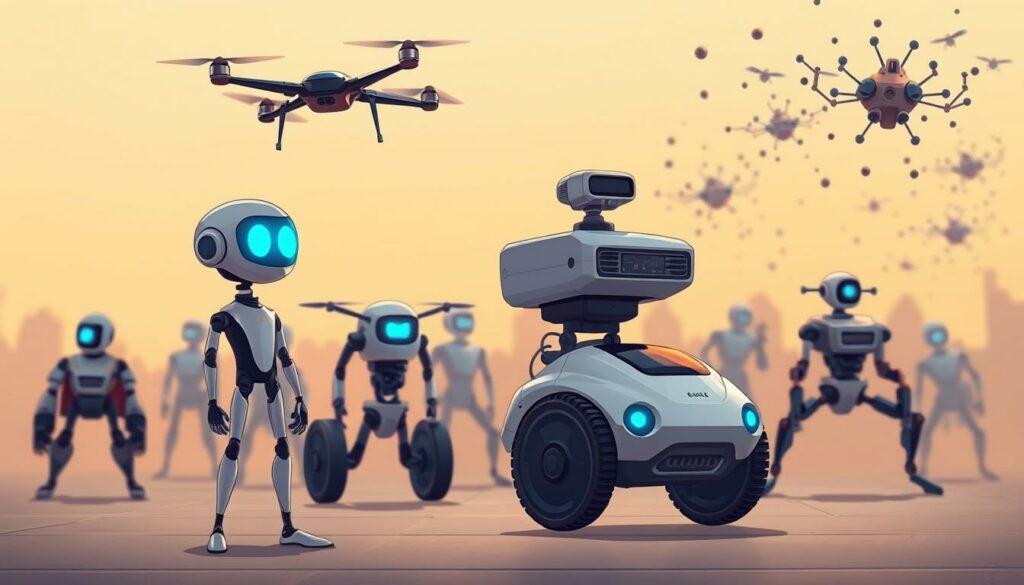We are on the cusp of a technological revolution, and artificial intelligence agents are leading the charge. Industries are being transformed by innovations in sophisticated chatbots, virtual assistants, autonomous robots, and complex simulations. As business decision-makers, it’s essential to understand the power of these intelligent systems and how they can empower your organization.
By harnessing the power of AI agent technology, businesses can drive growth, improve efficiency, and stay ahead of the competition. In this article, we will explore the world of AI agents, their definition, types, applications, benefits, and challenges.
Key Takeaways
- Understand the definition and types of AI agents.
- Discover the applications and benefits of AI agents in various industries.
- Learn how to choose the right AI agent for your business needs.
- Explore real-world examples of AI agents in action.
- Understand the challenges associated with implementing AI agents.
What are AI Agents and How Do They Work?
Businesses need to know about AI agents to stay competitive. AI agents change how companies work. It’s key to understand their role and uses.
Definition of AI Agents
AI agents, or intelligent software agents, do tasks on their own. They use natural language processing, decision-making, and tool integration. This lets them interact, gather info, and solve problems. Knowing what ai agent definition means helps businesses see how they boost efficiency.
These agents can see their surroundings and act to reach goals. They’re very useful in many fields, like customer service and data analysis.
Key Components of AI Agents
AI agents have sensors, actuators, and a knowledge base. Knowing these ai agent characteristics helps us see how they function. Sensors help them see their environment. Actuators let them act on decisions. The knowledge base holds the info for making choices.
- Sensors: Gather information from the environment.
- Actuators: Perform actions based on the decisions made.
- Knowledge Base: Stores the information used for decision-making.
With these parts, AI agents can work on their own. This makes them strong tools for businesses. As we learn more about AI agents, we see their huge impact on industries.
The Evolution of AI Agents
The journey of AI agents has been fast-paced and filled with innovation. We’ve seen big leaps that have turned AI agents from simple systems to smart, independent beings. They can now make complex decisions.
Historical Development
The idea of AI agents has been around for many years. At first, they were basic, following set rules. But as AI tech grew, so did the abilities of AI agents.
Now, we’re moving towards more self-sufficient systems. This is thanks to machine learning and natural language processing (NLP). These tools let AI agents learn from data, grasp complex commands, and talk to humans better.
“The future of AI agents lies in their ability to learn, adapt, and interact with their environment in a more human-like way.”
Milestones in Technology
There have been key moments in the growth of AI agents. A big step was the creation of deep learning algorithms. These have made it easier for AI agents to handle and understand big data sets.
- Advances in NLP have let AI agents understand and create human-like language.
- Machine learning has allowed AI agents to get better with practice and time.
- Better computers have helped make more complex AI models possible.
| Milestone | Description | Impact |
|---|---|---|
| Deep Learning Algorithms | Enabled AI agents to process large datasets | Improved data analysis capabilities |
| NLP Advancements | Allowed AI agents to understand human language | Enhanced human-AI interaction |
| Machine Learning Integration | Enabled AI agents to learn from experience | Improved AI agent autonomy |
As we keep exploring AI tech, AI agents will get even smarter. They will play a bigger role in many fields and our daily lives.
Types of AI Agents
AI agents come in several types, each with its own strengths and uses. Knowing these types helps businesses pick the best AI for their needs.
Reactive Agents
Reactive agents act based on what’s happening now, without thinking about the past or future. They react to specific things around them.
Key characteristics of reactive agents include:
- They respond to the current state of the environment.
- They do not have the ability to learn from past experiences.
- They are typically used in applications where the environment is well-defined and predictable.
Limited Memory Agents
Limited memory agents can remember past experiences to make better choices. But, they can only keep this information for a short time.
The benefits of limited memory agents include:
- Improved decision-making based on past experiences.
- Ability to adapt to changing environments to some extent.
- Enhanced performance in complex tasks.
Theory of Mind Agents
Theory of Mind agents are more advanced. They understand and interpret human thoughts and feelings. They can predict actions and make choices based on this understanding.
Their uses are wide-ranging, from talking to humans to helping in customer service and social robotics.

In summary, AI agents like reactive, limited memory, and Theory of Mind each have their own benefits and drawbacks. By understanding these, businesses can choose the right AI for their goals and needs.
Applications of AI Agents in Various Industries
AI agents are changing industries fast, making big changes in how businesses work. They are being used in many areas, touching sectors that were new to them before.
In healthcare, AI agents are making a big difference. They help improve patient care, make clinical work easier, and raise the quality of care. For example, AI chatbots give patients advice and support. AI tools help doctors find diseases early and accurately.
Healthcare
In healthcare, AI agents are used for many things, like:
- Predictive analytics to forecast patient admissions and optimize resource allocation
- Personalized medicine, tailoring treatment plans to individual patient needs
- Streamlining administrative tasks, reducing the burden on healthcare professionals
A study found that AI can change healthcare by making diagnoses better, making work easier, and engaging patients more.
“The integration of AI in healthcare is not just about technology; it’s about improving patient outcomes and saving lives.”
Finance
In finance, AI agents help find fraud, manage risks, and offer personal financial services. They also help with investment strategies and customer service.
Some key uses of AI agents in finance are:
- Fraud detection and prevention
- Algorithmic trading, enabling faster and more informed investment decisions
- Risk management, identifying and reducing risks
Customer Service
In customer service, AI agents provide 24/7 support. They help businesses answer customer questions quickly. AI chatbots solve complaints, give personal advice, and improve customer experience.
The benefits of AI agents in customer service are:
- Enhanced customer satisfaction through timely and personalized support
- Reduced operational costs by automating routine tasks
- Improved customer insights, enabling businesses to make data-driven decisions
As we keep exploring AI agents, their uses will grow. They will change industries and how businesses work.
Benefits of Implementing AI Agents
Companies can make their operations more efficient and improve customer happiness with AI agents. These agents can handle routine tasks, make better decisions, and offer tailored experiences.
Increased Efficiency
AI agents are great at automating simple tasks. This frees up people to focus on creative and strategic work. It makes businesses more efficient in many areas.
Experts say AI agents can quickly and accurately process lots of data. This means faster decision-making and fewer mistakes.
Enhanced Customer Experience
AI agents play a key role in making customer experiences better. They use customer data to give personalized advice and support. This leads to happier customers and more loyalty.
“The use of AI agents in customer service has revolutionized the way businesses interact with their customers, providing timely and relevant support.”
AI agents also help businesses answer customer questions quickly. This makes customers happier and more likely to return.
- Personalized customer interactions
- Improved response times
- Enhanced customer satisfaction
Using AI agents can bring many benefits to businesses. It helps them grow and stay competitive in their markets.
Challenges Involved with AI Agents
AI agents offer many benefits but also face big ethical and technical challenges. As we work on these agents for different fields, we must tackle these issues. This ensures they work safely and well.
Ethical Considerations
Ensuring transparency in AI’s decision-making is key. As AI agents get more independent, it’s vital to know how they decide. We need ways to make AI’s choices clear and easy to understand.
Another big ethical problem is accountability. When AI agents make big decisions, we must figure out who’s to blame. We need clear rules for who’s accountable to use AI responsibly.
Also, AI agents must not be biased and must be fair. We must think carefully about the data used to train AI. We also need to find and fix any bias in AI.
Technical Limitations
From a tech side, a big challenge is not fully understanding complex AI models. As AI gets smarter, it’s hard to see how it works. This makes it tough to spot any problems.
Another tech issue is data quality and availability. AI needs good, varied data to work right. Making sure this data is reliable and relevant is key for AI’s success.
Lastly, making AI agents work with other systems is hard. We must make sure AI agents can easily work with other tech. This will help us get the most out of AI.
By tackling these ethical and technical hurdles, we can use AI agents fully. This way, we can avoid their risks.
The Future of AI Agents
AI agents are on the verge of a big change. New trends and innovations will shape their future. It’s important to know what’s coming.
Trends to Watch
Several trends will change how AI agents work. These include:
- Increased Adoption in Industries: AI agents will be used more in healthcare, finance, and customer service.
- Advancements in Natural Language Processing (NLP): Better NLP will help AI agents understand and answer human questions better.
- Enhanced Personalization: Future AI agents will offer more personalized experiences thanks to advanced data analysis.
Emerging Technologies
New technologies will also shape AI agents’ future. Some key ones to watch are:
| Technology | Description | Impact on AI Agents |
|---|---|---|
| Edge AI | Processing AI algorithms at the edge of the network, closer to the data source. | Reduced latency and improved real-time processing capabilities. |
| Explainable AI (XAI) | Techniques to make AI decisions more transparent and understandable. | Enhanced trust and reliability in AI agent outputs. |
| Quantum Computing | Leveraging quantum computing principles to solve complex problems. | Potential for significantly improved processing power for complex AI tasks. |
As these trends and technologies grow, AI agents will get smarter and more important. Keeping up with these changes is key for businesses wanting to use AI agents fully.
How to Choose the Right AI Agent for Your Business
Choosing the right AI agent for your business can seem hard. But, by looking at what you need and what’s out there, you can pick the best one. This choice should help your business grow and succeed.
Assessing Your Needs
First, you need to assess your business needs carefully. Think about what you want to solve with an AI agent. This could be better customer service, more efficiency, or deeper data insights.
- Identify the primary objectives you want to achieve with an AI agent.
- Analyze your current infrastructure to ensure compatibility with AI solutions.
- Consider the scalability of your needs and whether the AI agent can grow with your business.
Evaluating AI Agent Solutions
After knowing what you need, it’s time to evaluate AI agent solutions. Look at what each AI agent can do, what it offers, and what it can’t. This will help you find the best match for your business.
When checking out options, think about these key points:
| Feature | Description | Importance Level |
|---|---|---|
| Integration Capability | Ability to integrate with existing systems | High |
| Customization Options | Flexibility to customize the AI agent according to specific needs | Medium |
| Support and Maintenance | Level of support and maintenance provided by the vendor | High |
By carefully looking at your needs and the options available, you can pick an AI agent. It should meet your current needs and help your business grow in the future.
Real-World Examples of AI Agents in Action
AI agents are changing businesses in many ways. They make customer service better, operations smoother, and innovation easier.

Case Studies in Business
Many companies have seen big wins with AI agents. For example, a top online store used AI to give customers better product suggestions. This led to a 25% increase in sales.
Another company, in finance, used AI to spot fake transactions. They cut down on false alarms by 30%.
These stories show how AI agents can help in different ways. They give us ideas on how to use AI in our own businesses.
- Improved customer service through AI-powered chatbots
- Enhanced predictive maintenance in manufacturing
- Optimized supply chain management through AI-driven analytics
Success Stories
A healthcare company used AI to look at patient data. This led to more accurate diagnoses and personalized treatment plans. Patients got better care, and costs went down.
In retail, a big store used AI to manage its stock better. This cut down on stockouts and overstock situations. Customers were happier, and the store saved money.
These stories show the real benefits of AI agents. They help businesses innovate, work better, and serve customers better.
Getting Started with AI Agents
Exploring AI agents has shown us their power for businesses. To start, we must know the steps for implementing them.
Practical Steps
First, figure out what your business needs. Look for areas where AI agents can help. Then, pick the best AI agent for your company.
Think about how well it scales, integrates, and feels to users. These are key factors.
Learning Resources
For more knowledge, many learning resources exist. Check out industry reports, research papers, and online courses. They keep you updated on AI agent tech.
By taking these steps and using the right resources, businesses can fully benefit from AI agents. This leads to innovation.
FAQ
What are AI agents, and how do they work?
AI agents are smart software that can see their surroundings and act to reach goals. They have sensors, actuators, and a knowledge base. These parts help them work.
What are the different types of AI agents?
There are many AI agents, like reactive, limited memory, and theory of mind agents. Each is good for different tasks and situations.
What are some examples of AI agent applications?
AI agents help in healthcare, finance, and customer service. They solve complex problems, make things more efficient, and improve customer service.
What are the benefits of implementing AI agents?
AI agents make things more efficient and improve customer service. They automate tasks, offer personalized help, and analyze data for better decisions.
What are some of the challenges associated with AI agents?
Challenges include ethical issues, technical limits, and needing good data. There are also risks like bias and job loss.
How do I choose the right AI agent for my business?
First, figure out what you need and look at possible solutions. Think about the task, complexity, and how it can grow.
What is the future of AI agent technology?
The future looks bright with new trends and technologies. Advances in natural language, computer vision, and machine learning will shape the next AI agents.
How can I get started with AI agents?
Start by understanding your business needs and where AI can help. Look at solutions, check vendors, and plan how to use them.
What are some real-world examples of AI agents in action?
AI agents are used in chatbots, virtual assistants, and predictive systems. These show how AI can change industries and improve results.
What are intelligent software agents, and how do they relate to AI agents?
Intelligent software agents are smart software that can act based on their environment. AI agents are a special kind that use artificial intelligence to function.


Comments are closed.